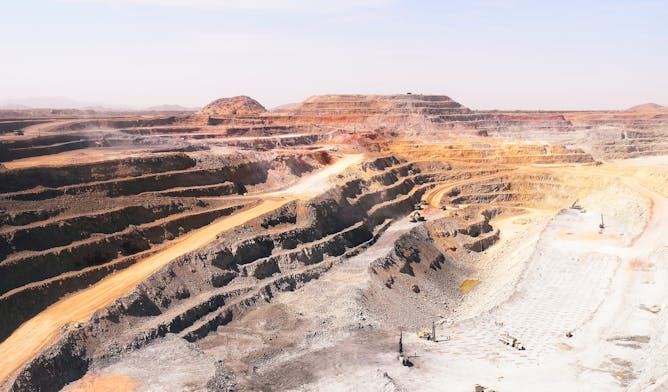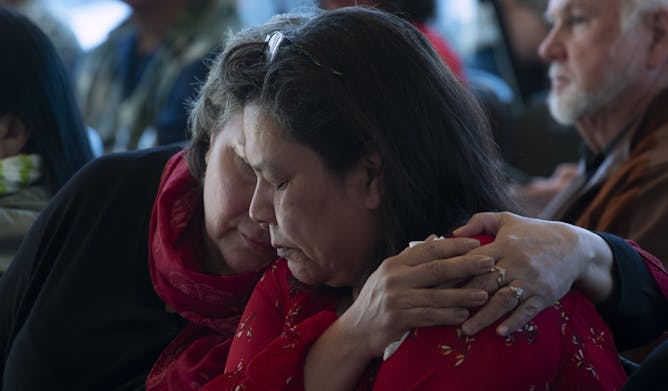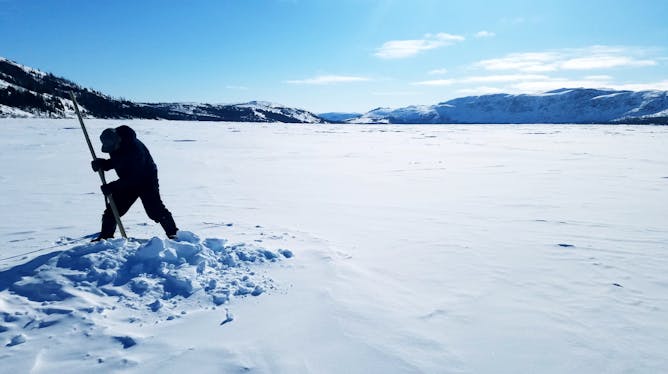|
Many people are focused on the upcoming U.S. presidential election, concerned for their friends, family and community connections. President Donald Trump’s campaign has made waves in some Christian communities, as they reckon with the terrible twinning of Christian religious language and symbols alongside authoritarian, xenophobic and white supremacist dog whistles that have been used by the Trump campaign.
Today in The Conversation Canada, Tony Keddie of the University of British Columbia writes about how Trump and his Republican strategists have “used Christianity to draw battle lines in this high-stakes election,” prompting outrage among many across the Christian religious spectrum from so-called “progressives” to “evangelicals” and “conservatives.”
Keddie notes that Democrats’ efforts to challenge the right’s attempt to own Christian identity and values could be critical in the final days of the campaign, including among previous Trump voters who have not yet publicly declared their intentions.
Keddie’s book, Republican Jesus, identifies key trends in the way today’s right-wing influencers interpret the Bible: “They view Jesus as a prophet of free-market capitalism who opposes taxes and is against any regulation that supports social welfare programs, protects workers or prevents discrimination.”
Also today:
Regards,
|

U.S. President Donald Trump staged a visit in front of St. John’s Church June 1 in Washington after authorities cleared protestors from the area, prompting the bishop overseeing the church to express outrage.
(AP Photo/Patrick Semansky)
Tony Keddie, University of British Columbia
The Republican political strategy that uses Christian language to cast Trump as a divinely appointed protector of an authoritarian Christian nation warrants more scrutiny than it's received.
|

The Bisha mine in Eritrea is seen in November 2017.
(Martin Schibbye/Creative Commons)
Elizabeth Steyn, Western University
Why a mining company's quiet settlement of a slave labour case is big news.
|

Margaret Swan, left, embraces Mariette Buckshot after she spoke during an Indian Day school litigation announcement in Ottawa, Tuesday, March 12, 2019.
THE CANADIAN PRESS/Adrian Wyld
Jackson Pind, Queen's University, Ontario; Raymond Mason; Theodore Christou, Queen's University, Ontario
Canada is accepting claims emerging from a settlement with survivors of Indian day schools, but there has yet to be a public inquiry. There is an urgent need to hold Canada accountable.
|

Sewage testing can be used for early detection of disease.
(Shutterstock)
Lawrence Goodridge, University of Guelph
Identifying the emergence of a disease often relies on sick people seeking medical help. Wastewater monitoring can identify pathogens days or weeks earlier.
|

With more health resources devoted to COVID-19, non-COVID patients may have unmet health-care needs, which predict poorer health in the future.
(Shutterstock)
Mehdi Ammi, Carleton University
With COVID-19 placing heavy demands on the health-care system, non-COVID patients may struggle to access care, putting women, people in poor health and those without a regular doctor at risk.
|

Un pêcheur inuit creuse la glace de façon traditionnelle afin d'installer ses filets.
Véronique Dubos
Véronique Dubos, Institut national de la recherche scientifique (INRS)
Les Inuits conçoivent que tous les êtres vivants ont un certain libre arbitre. Et si la rigide science cartésienne s’ouvrait un peu à cette vision du vivant ?
|
Health
|
-
Michael Goran, USC Dornsife College of Letters, Arts and Sciences
This could be your healthiest – and most fun – Halloween ever, despite COVID-19. It's a great time to ditch the sugar.
|
|
Arts
|
-
Laura Varnam, University of Oxford
It's a very modern version which gives the female characters more agency than in previous adaptations.
|
|
Science + Technology
|
-
James Mortimer, The Open University; Mahesh Anand, The Open University
Two new studies significantly advance our understanding of water on the Moon and where to find it.
|
|